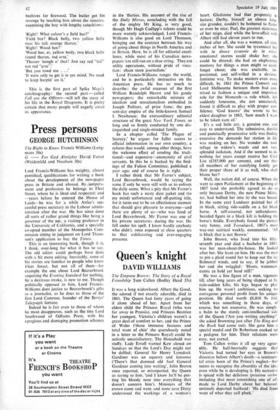Queen's knight
DAVID WILLIAMS
The Empress Brown: The Story of a Royal Friendship Tom Cullen (Bodley Head 35s)
It was a long widowhood. Albert the Good, the adored if not exactly adorable, died in 1861. The Queen had forty years of going it alone ahead of her. Apart from her eldest child the Princess Royal (who was far away in Prussia), and Princess Beatrice her youngest, Victoria's children weren't a great deal of comfort to her, and the Prince of Wales ('those immense features and total want of chin' she querulously noted in a letter to the Princess Royal) could be actively unsatisfactory. The Household was stuffy. Lady Erroll wanted Kew closed on Sundays so that the Lord's Day might not be defiled; General Sir Henry Lynedock Gardiner was an equerry and tiresome (There's that domned old fool General Gardiner coming into waiting', John Brown once reported, or misreported, the Queen as saying to him, 'and I know he'll be put- ting his bloody nose into everything that doesn't concern him'). Ministers of the crown came and went, and none save Dizzy understood the workings of a woman's
heart. Gladstone had that propensity to lecture; Derby, himself an almost king. size grandee, couldn't be bothered to flatter or even be nice; Peel, the greatest statesman of her reign, died while the love-affair with Albert still had eleven years to run.
And after all, she was a woman, all sixty inches of her. She could be tyrannical but
with la douce tyrannie de la mere;
emotional storms could shake her; she could be shrewd; she had an elephantine memory for things a man might so easily forget about; she was excitable, im- passioned, and self-willed in a devious, feminine way. To make matters even more difficult, by 1861 the Prince Consort and Lord Melbourne between them had con- trived to fashion a unique and important role for the Monarch—a role which, left suddenly lonesome, she not unnaturally found it difficult to play with proper con- fidence. 'God knows' she wrote to her eldest daughter in 1865, 'how much I want to be taken care of.'
It's a sad little cry, a genuine one, and easy to understand. The submissive, dutiful and punctually procreative wife was finding excessive the demands her station in life was making on her. No wonder she took refuge in widow's weeds and not very
splendid isolation. And if she seemed to do nothing for years except receive her Civil
List (£385,000 per annum), and see that all members of her ramifying family got their proper share of it as well, who shall blame her?
Well, the nation did, of course. When she went to open Parliament at the beginning of 1867 (and she probably agreed to do so
only because Derby, the new Prime Minis- ter, had bullied her into it) she was booed.
In the same year Landseer painted her all
in black, sitting side-saddle on a fat black horse. A self-assured, not unhandsome.
bearded figure in a black kilt is holding the horse's bridle. Everybody found the picture very funny, and Tomahawk, 1867's most way-out satirical weekly, commented: `All is black that is not Brown.'
John Brown, who lived into his fifty- seventh year and died a bachelor in 1883.
was her man-about-the-house. He looked
after her. She leant on him. He was the man to pin a plaid round her to keep out the icy Balmoral winds, and to say, if he jabbed her and she wriggled : 'Hoots, wumman. canna ye hold yer head still!'
He was a fine figure of a man, vigorous till, after long years of being slapped at by rain-sodden kilts, his legs began to play him up. He wasn't ambitious, seeking no
outrageous personal profit from his unique position. He died worth £6,816 9s lid.
which was something in those days, of course, but not excessive. He was simple. a balm to the sturdy anti-intellectual side of the Queen ('Are you writing anything?'
she asked Browning just after The Ring and the Book had come out). She gave him a
special medal and Dr Robertson cooked up a pedigree for him. Their relations were cosy, not carnal.
Tom Cullen writes it all up very agree- ably. He half-heartedly suggests that
Victoria had turned her eyes in Brown's direction before Albert's death—a sentimen- tal crisis born of the Prince's neglect—but
seems to recognise the absurdity of the idea even while he is developing it. His narrative is spiced with her delicious ipsissima verba including that most astonishing one of all. made to Lord Derby about her beloved. untimely departed husband: 'He died from want of what they call pluck.'


































 Previous page
Previous page